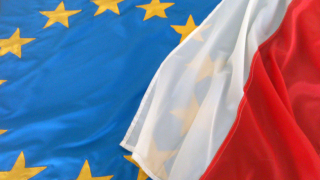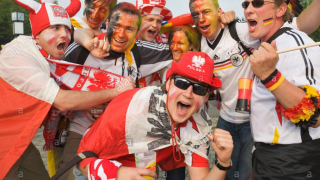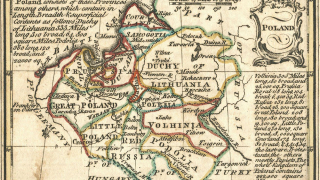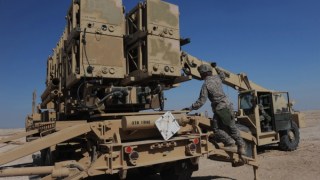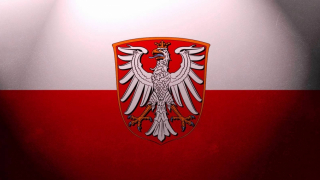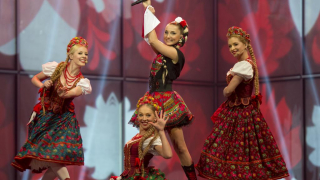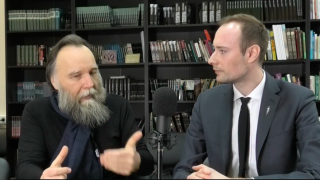„The Poppies Blow…”
Manchester United footballer, Serbian Nemanja Matić denied wearing a Red Poppy Badge (symbol of the Remembrance Day) arguing, that if it commemorates British Soldiers, so also those who served during NATO's aggression against Yugoslavia. And it would be difficult to not agree with this brave sportsman.
The genesis of this action dates back to the 1920s and the trauma suffered by the British during the Great War[i]. For the very first time since Centuries, the Empire aspiring to control the World thanks to its commercial power, secured by the Navy “ruling the Waves” – was forced to fight with participation of own subjects, not “Hessians”, not Askaris, and not only paying for military involvement of other nations. However, the shock taken from Flanders' mud did not turn out to be so paralyzing for the UK, as even the larger French victim has become, and Poppies - having practical significance (because the sale of badges is supposed to help veterans and their families and protect places of remembrance) - become also a symbol of the Empire's triumph. Even (especially…) when it felt down.
Bloody Hands of the British Army
As we can see, refusing unwanted symbol [ii] Matić has not met a trivial matter. In a beginning of November Poppies are just everywhere in the UK – shops, pubs, streets, TV-shows. They commemorate not only the fallen in the Great War (which the British have invented, provoked and carried out, and Volenti Non Fit Iniuria). How correctly Matić was told (what provoked his reaction) - it is about the entire military effort of the UK in the 20th and 21st Centuries. So, looking the these small flowers – we should see also the concentration camps for the Boers, executed Greek partisans, the British Army murders and rapes in Kenya, Malaysia, Oman, Yemen, common with "Israel" aggression on Egypt, the Cyprus Emergency, Malvinas, participation in almost all US aggressions in the World, starting in Korea, Vietnam, through Yugoslavia, Afghanistan, Iraq, Libya to Syria - and, of course, the still shameful occupation of Northern Ireland.
Respect for the Warriors (also foreign and sometimes even enemies) is important component of our Civilisation. But respect does not equal adoration and cult. 72 British soldiers were killed in action in Bosnia and Kosovo. So, the Red Poppies are also for them, and it is difficult to wonder why this Serb does not want to wear such a symbol of aggression against his Fatherland. Similarly, understandable is position of Irish Catholic form Derry, James McLean, who consequently refused to take a part in this pseudo-patriotic show and was regularly chastised by Stoke City FC managersfor refusing to place the flower on his match-day gear. McLean explanation is the same: for him Poppy is just a symbol of “Bloody Sunday” [iii] butchers!
Let’s Choose Peace
The matter is not so clear-cut even among the indigenous inhabitants of the British Isles. In Scotland, for example, it is especially delicate question because Scotts were always the best soldiers in the British Army - and always has been sent to the first line. Red Poppies (necessarily four-, not two-leafed as in England) are therefore for its own veterans and in respect to the blood shed in the name of a sense of duty, even if imposed by the policy of London. But just to point out that Scotland is already fed up with imperial British wars in the name of City (or Wall Street) interests - you can (as in Ireland) wear White Poppy, giving respect to the fallen, but at the same time standing up against War and Militarism. The most warlike people on the Islands in the past - today wants peace, a future outside NATO, with no nuclear weapons on their own territory and without sending Scottish boys to distant parts of the World, no matters in what Empire interest for.
This issue is publicizedby Serb working in the UK – what reminds, that over 1.5 million immigrants from Central and Eastern Europe living on the Islands have to answer a similar question. These people (wanting or not) meet local traditions and customs. It is clear, that for many they remain indifferent and foreign… affairs, others would like to refer to them, often with the best intentions. Especially because the respect for veterans is in some extent inscribed in the identity of the Central European nations - Poles, Hungarians, Romanians and Bulgarians. It should also be noted that for those living in Western countries (even coming from our part of the World) - the problem of war still remains quite abstract, being something between a boring historical tale, a switch of a piece of daily news and a movie motif. Meanwhile, the British Army is still fighting for real, still guarding the interests of the Empire, (in fact the same as previously, but nowadays with the official capital not in London…). And in fact, these are not fictional, neither abstract dangers. Because if there was a global nuclear war, then one of its first goals would be ... Scotland (or more strictly the base of nuclear submarines in Faslane, near Glasgow), and at the same time also equally densely inhabited (by both, local and immigrants) Western Germany, with special attend to the Ramstein Air Base surrounding area. The authorities of Poland, Romania, Bulgaria and Albania are also doing their best to add new towns and points to this Black List of Death, following Redzikowo in Poland, Camp Mihail Kogalniceanu in Romania and Novo Selo Training Area in Bulgaria (including soon some new objects in Ukraine). So, instead of worrying about the fallen in past, non-Continental/European wars, let's start to think better how to avoid European victims in wars that may yet come.
Especially living away from home, with all due respect to the habits of the hosts - at least in two points we should agree with Scots, Irishmen or these reasonable English, understanding that:
- someone else's wars are not our wars,
- the next war may be tragically the last for many (especially Europeans).
And, therefore, like Matić, let’s reject the Imperial symbol by wearing the White Poppy, not the Red one. Choosing Peace, instead of War and destruction.
[i] The inspiration for choosing a poppy for the symbol of blood shed by British soldiers was a popular John McCrae’s poem „In Flanders Fields”:
“In Flanders fields the poppies blow
Between the crosses, row on row,
That mark our place; and in the sky
The larks, still bravely singing, fly
Scarce heard amid the guns below (...)"
[ii] In a statement published on the social portal, Matić wrote: "I recognise fully why people wear poppies, I totally respect everyone's right to do so and I have total sympathy for anyone who has lost loved ones due to conflict. (…) However, for me it is only a reminder of an attack that I felt personally as a young, frightened 12-year old boy living in Vrelo, as my country was devastated by the bombing of Serbia in 1999. Whilst I have done so previously, on reflection I now don't feel it is right for me to wear the poppy on my shirt. (…) I do not want to undermine the poppy as a symbol of pride within Britain or offend anyone, however, we are all a product of our own upbringing and this is a personal choice for the reasons outlined”.
[iii] Bloody Sunday (or the Bogside Massacre), on 30 January 1972 in the Bogside area of Derry, Northern Ireland, when British soldiers shot 28 unarmed civilians during a peaceful protest against occupation and military intervention.



